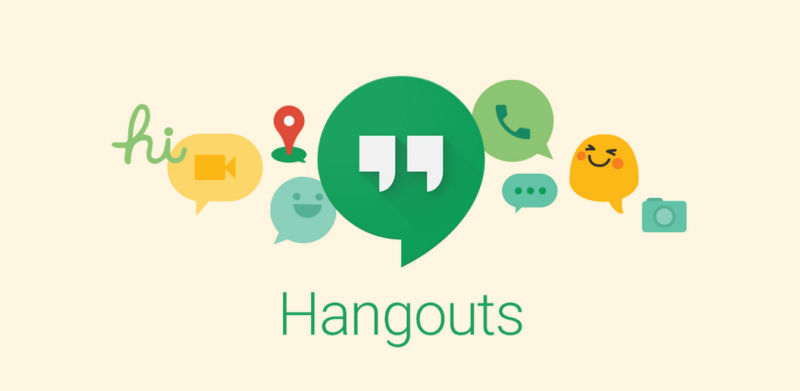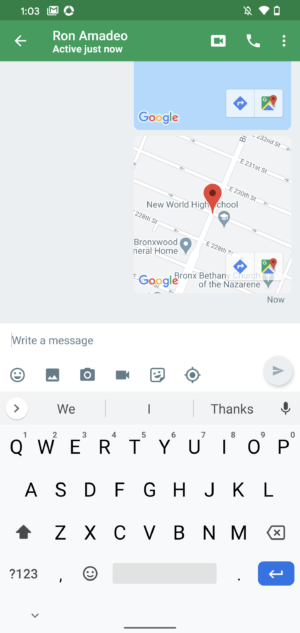

Google strips location sharing from Google Hangouts | Ars Technica
source link: https://arstechnica.com/gadgets/2020/03/google-strips-location-sharing-from-google-hangouts/
Go to the source link to view the article. You can view the picture content, updated content and better typesetting reading experience. If the link is broken, please click the button below to view the snapshot at that time.
LEAVE HANGOUTS ALONE —
Google strips location sharing from Google Hangouts
Google seems determined to kill its best messaging app.
Ron Amadeo - 3/18/2020, 1:48 AM

Google is stripping away a key feature from its best and most popular messaging platform. Google Hangouts users are no longer able to share their locations with one another.
It's not clear why Google is suddenly stripping away features from Google Hangouts, but an update to the Hangouts Android app, version 32, removes the location button from the text input area. Previously, the button would do a one-time ping of the user's location, mark it on Google Maps, and send a link and in-line map to the chat window. In the past, this worked on Android and iOS, though at some point it was removed from the iOS version. Hangouts users will have to switch to real-time location sharing through Google Maps.
It's hard to know what Google's future messaging strategy is. This Hangouts merger looks like a mess, and it's not clear if pushing a Slack-like service onto consumers would work. There are also rumors of a second Slack-like enterprise messaging app that would merge functions from Gmail, Drive, Hangouts Chat, and Hangouts Meet. If that sounds extremely redundant compared to this Hangouts merger, you're right, but that has never stopped Google before.
Google's only other active messaging service is "Google Messages," but this is tied to the boat anchor that is carrier-controlled messaging standards. Google Messages works with the ancient SMS standard or the meager upgrades provided by the carrier's plan for SMS's replacement, RCS. Either way, Google Messages lacks encryption, a centralized account system, and desktop apps, so we have trouble seeing how it would ever compete with an over-the-top messaging system like iMessage or Facebook Messenger.
Hangouts has over a billion installs on the Google Play Store. It was the successor and in-place upgrade to Google Talk, so it has a user base dating back 15 years. For a long time, it was also a default Android app that shipped on every device. To this day, the chat service is still integrated into Gmail and has wider platform support than any other Google messaging product. There are apps for Android and iOS, an always-on Chrome app that works on Windows, Mac, Linux, and Chrome OS, a website at hangouts.google.com, integration with Gmail.com, and even apps for smartwatches. For Google Fi and Google Voice users, Hangouts is the gateway to their cloud-based phone number, handling text messages and phone calls on basically any platform. It also used to be a general SMS handler for Android and could merge SMS and Hangouts messages for each contact.Hangouts doesn't have a direct attachment to revenue, though (other than keeping people in the Google ecosystem), and none of these user-centric strengths were enough to earn Hangouts a steady line of support from Google. Today, years of neglect have left the product with an aging codebase and a lack of modern features, like end-to-end encryption. Google wants to shut the product down rather than support it, but Hangouts is still so integrated into the Google ecosystem that killing it is a complicated process, and there is no clear replacement for many users to move over to.
Promoted Comments
-
Google giveth and Google taketh away.
And then Google giveth something similar to what was takeneth away, but minus some features and then Google giveth another product that sounds like a feature that could have been added to either the first thing that was giveneth or the second thing that was giveneth away and then Google migrateth the second thing into the third thing, upsettingeth the loyal customers before givingeth another product and takeingeth away all other products before reversing course and migratingeth one of the products to be an enterprise solution and creating three clones of other people's products, and watching them be less successful.
Then Google giveth and taketh again.
Recommend
About Joyk
Aggregate valuable and interesting links.
Joyk means Joy of geeK
